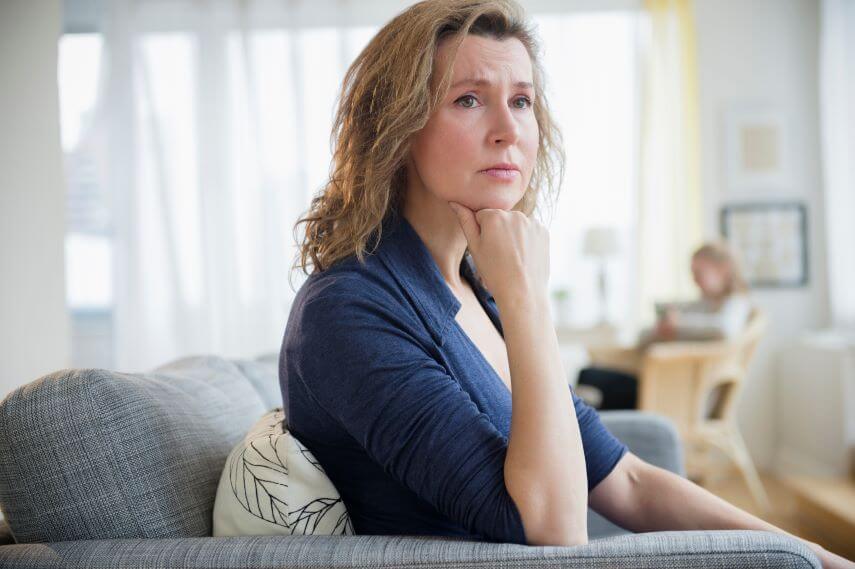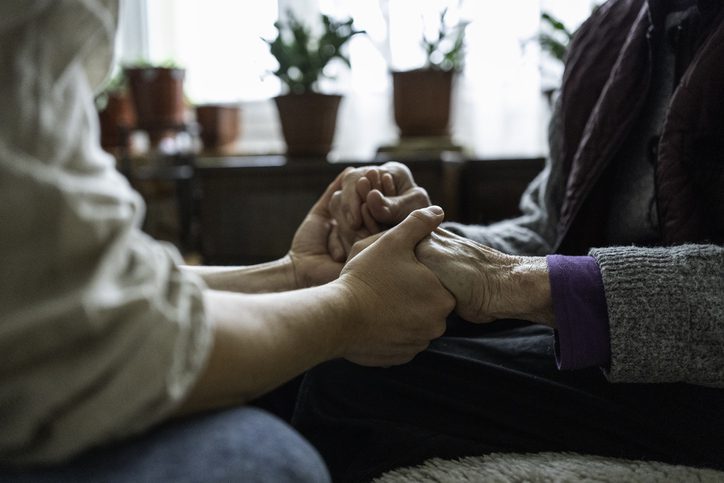An ad for home care or assisted living pops up on your screen. Two people—usually an aging parent and an adult child—are smiling, walking down a long hallway with arms linked. Or, they’re sitting side by side on a couch.
Caregiving is often portrayed as a dynamic between a loving parent and child. But this isn’t the reality for everyone.
“The image of the loving relationship between a care partner and their ‘loved one’ is not as common as we are led to believe,” says Pamela Corsentino, a licensed professional counselor. “People come into the care dyad with a relationship history which is not often idyllic.”
The Role of Grief in Complicated Care Relationships
The reasons for these complicated relationships are as varied as the people in them. Kimberly Nelson, a clinical social worker and psychotherapist, believes there’s a strong connection to grief.
“It may be particularly difficult if the caregiver themselves is grieving too,” says Nelson, who specializes in international adoption and grief. “The caregiver is experiencing complicated grief and now has an additional role to fill.”
Types of Complicated Grief
What does that complicated grief look like? It’s different for every person. For those asked to care for a parent, spouse, ex, or relative with whom there’s a strained relationship, there’s grief over the circumstances that led to the strained relationship. This could be either past or present. There might be feelings of guilt for wanting to say no to caring for this person (especially a person who might not have cared well for them)—but also not wanting to abandon this person in a time of need. Other feelings may include resentment for being put in the position to decide, fear about being connected with a person who is or has been toxic, anger over being the one who must be responsible and more.
Nelson says the caregiver may also be experiencing disenfranchised grief—a term defined by death and dying by grief expert Kenneth J. Doka, PhD—which refers to “grief that is not fully recognized by society.”
When Complicated Grief Surfaces
For many who find themselves in complicated relationships, this grief may not surface until they’re plunged into a caregiving situation. Often this happens with little choice or time to prepare. Soon, the difficult decisions facing a newly minted caregiver disrupt what may have been a stable relationship. This can be the case even if it wasn’t a positive or thriving one.
This was the case for Hayley Croom, a small business owner from York, Pennsylvania, who is now the power of attorney and sole family contact for her 79-year-old mother with Parkinson’s.
“We’ve never had an easy relationship, and I’m working through the realization that she (and both of my dads) have narcissistic-type behaviors and have emotionally neglected me since childhood,” Croom says.
Croom’s mother was recently admitted to full nursing care. She alternates between praising her daughter for her ability to manage everything and raging at her for putting her into nursing care, walking the line between lucidity and delusion, Croom says. “Some days it’s hard to tell which is which.”
Why Managing Difficult Care Is a Family Affair
Whether you’re an only child or have many siblings, there are a variety of stressors factored into a strained caregiving scenario:
- Maybe you’re responsible for the care decisions—not by choice, but by practicality or geographic proximity—and a sibling disagrees with the way you’ve managed a parent’s care.
- Perhaps a parent remarried later in life and cut off contact with you and your siblings, favoring the new spouse’s children instead.
- Maybe a parent was abusive, but your siblings or other family members don’t know about the history of abuse and don’t understand why you don’t want to take responsibility for care.
In other cases, the stressors come from the other side of the equation:
- Sometimes, adult children want to provide care or support and a new spouse or partner blocks their efforts and intentions.
- In some cases, adult children are willing to help. They may even be willing to partner with siblings from whom they’ve been estranged. But, a parent or relative rejects help because of a difficult diagnosis.
- Sometimes, adult children disagree with a parent’s decision to care for an ex-spouse.
Navigating Strained Care Situations
These are just several examples of strained care situations, and each one brings its own challenges, grief and hardships. Money also plays a part, as ex-spouses may be entitled to certain retirement or Social Security benefits.
“I have had clients on both sides of this situation and it is tough,” says Corsentino. “Working through and past these experiences is key to reducing the stress and negative emotions during the care journey.”
Even if you’re an only child, you may face complicated decisions while navigating tense relationships.
After her stepfather filed for divorce in the months leading up to her mother’s transition to a nursing home, Croom was “left holding the proverbial bag.” She was fully responsible for her mother’s medical care, housing, finances and legal concerns.
How to Cope with a Complicated Caregiving Situation
If you’re in the midst of caring for a person who’s not a so-called loved one, there are two people Corsentino and Croom recommend having in your corner. These include an elder law attorney and a therapist.
Estate planning financial and legal implications, advanced directives and paying for long term care are complex. This is especially so in a family with conflicts. Although many believe they can’t afford to pay for an elder law attorney, Corsentino says “you can’t afford not to have one.”
For Croom, weekly therapy has been a lifeline. It helps her manage the immediate emotions of the situation and process the long term dysfunction in her relationship with her mother.
“With my therapy tools, I’ve been able to identify and set some really big, very firm boundaries that have kept me from becoming completely consumed by my mother’s chaos,” Croom says.
Learning from Complicated Caregiving
Though it can be filled with heartaches and headaches, there can also be life lessons wrapped up in a complicated caregiving relationship.
Croom learned she was not alone in her experience of caring for a parent in a way that didn’t resemble a cheerful senior living ad.
“Once I started talking transparently about my experiences, I was surprised how many other people are caught in a similar situation with their parents in one form or another,” she says.
She was also surprised by how much assistance is available. However, it can be incredibly difficult to find unless you happen upon the right person. “We’re only at the facility we are because of a hospital social worker’s casual comment; otherwise, I would never have even considered that we’d be able to afford it,” says Croom.
Tapping into home or community-based resources that are available locally, statewide, nationally, or even virtually is critical. Strained relationship or not, caregivers cannot do it all. Many people are not aware of what’s available because it’s hard to find, as Croom said, or because no specific person is pointing them towards said resources. A hospital social worker or discharge planner may be a valuable guide.
Croom also learned the importance of having frank discussions about money and finances. Ideally, you should do this before a caregiving situation arises. “Money surprises are always awful, and parents can hide things from their adult children until it’s too late to compensate.”
Not All Caregivers Are the Same
Sometimes, your role as a caregiver may look different than the traditional, idealized version we see in society. Plus, there are many types of caregivers, and direct daily care is only one aspect of caregiving, Corsentino says. Not everyone in need of support requires that level of care.
“It is not a bad thing to be the banker (the person who writes the checks),” she explains. “And you are not obligated or required to be the [primary, full-time, hands-on] caregiver.”
Takeaways for New Caregivers and Care Partners
There are no easy answers when you’re dealing with complex caregiving relationships with grief, trauma and estrangement. You may never come to a place of reconciliation or resolution. However, you can and should protect yourself with self-compassion, boundaries, and an openness to change—from either side.
“Figure out exactly what you are really, honestly, willing to do, long term,” Croom says. “Consistency is vital in managing expectations and maintaining your boundaries, and jumping in to do everything when you know you can’t keep it up is a recipe for burnout and crisis.”
Croom reminds others in complicated care partnerships that big feelings are totally normal.
“Know that it’s okay and healthy to have really big, complicated feelings about your role; it’s okay to be angry, sad, guilty, resentful. This is an incredibly hard situation. It’s important to give yourself space to feel all the emotions it will trigger.”
Are you in a complicated caregiving situation? Tell us what you’ve learned and how you’re managing.







You focused mostly on caregiving for parents. It more complicated when it’s between husband and wife. Any good marriage is a partnership and when the “doing” what needs to be done shifts heavily or exclusively to one partner the burden, aches and even resentment can start. Add length of time that this goes on without change or help it takes special effort to hang in there. Lost of affection and intimacy only greatly complicates matters. Only a daily Godly presence can hope to equalize the downward pressure.
Why are resources so hard to find? When I had to care for my husband with ALS, diabetes and legally blindness (along with a toxic relationship with him) I was never told about such resources. It’s small town Alaska too where the medical isn’t so good. I had to deal with it pretty much alone and uninformed about so many aspects. Looking back I’m really astonished at the lack of knowledge from the medical community here, both about his illnesses and how to cope with a toxic caregiver situation.
Excellent information on so many levels!👍. Please continue to provide the narratives , & the RESOURCES people can use /go to for help and support.
🌷Thank you
Thank your for your timely topic.
My situation is complicated but not due to past conflict. I’ll just bullet the situation:
ME-
Private home health provider.
*Reside in nearby city.
CLIENT-
* Three-time widowed,
*90 year young with Pacemaker
*Mobil
*Curious and still learning
*Mild dementia
*Lonely + Lonely
*Kind and gentle
*Living in own home
*Not eating well
*Does not want to go to assisted living.
*Family living in other States.
*Wants to treat me like a wife/girlfriend.
At 90, few male friends.
I think relationship is confusing for him because he has always had a wife by his side. I’m wife nor girlfriend and feel the need often to reinforce that boundary. This is further complicated/challenged by dementia or sheer will.
Not quite sure how to handle. Help.
I have been working as an aide for eight years and have seen much of what you mentioned. Sorrowing and loving children just looking for a few hours respite. Others, hoping for the burden to be over as soon as possible with no love to give. Very difficult parent with a patient, loving daughter. I’ve dealt with Aphasia, Lewey body, mild dementia to Alzheimer’s. There were some of the elderly one was led to believe never had a kind word to say to anyone all their life and were not going to start now. But, according to the family, was a hard working, kind person all their life until late in life. I was a stranger to all these people, so could go home to my normal life, but for the family caregiver, if there was one, it was a constant. With those who really cared, I was happy to do what I could to help them, too.